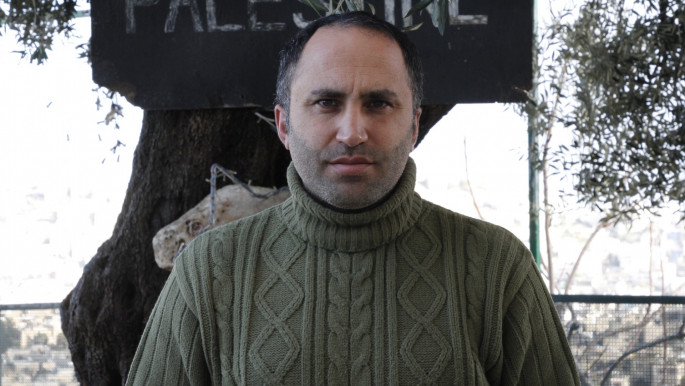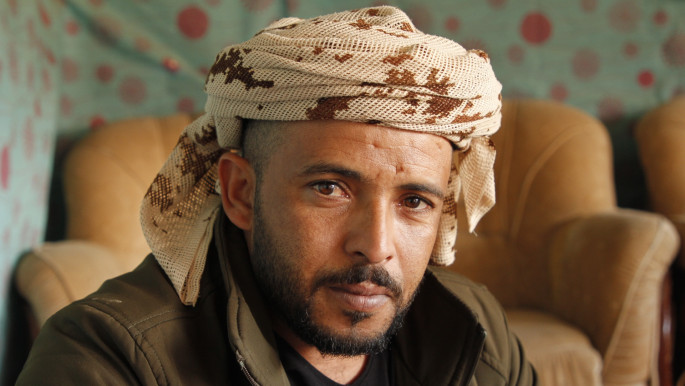Doubt and division cast a shadow over Palestinian elections
The elected legislative council members, 132 in total, will automatically get seats in the Palestinian National Council (PNC) of the Palestine Liberation Organisation (PLO).
An unspecified number of councillors of the PNC will come from Palestinians in the diaspora through elections abroad, where possible, or otherwise appointed by the different Palestinian factions.
The call for elections on 15 January came in the form of presidential decrees following months of talks between Fatah and Hamas. It indicated that the two rival factions might be closer towards reconciliation after more than 13 years of strife and animosity.
The two factions will still have to agree on an elections court - the judiciary body that will hear potential petitions against the results of parliamentary elections.
But a crackdown by Palestinian security services on political dissidents, both in the West Bank and Gaza, and the curtailing of the independence of the judiciary have cast doubts on whether the elections will really be free.
"Political arrests are on the rise after the resumption of security coordination between the PA and Israel. Today journalists are arrested, lawyers, university students, civil leaders," Mohannad Karraja, a civil rights lawyer in Ramallah, told The New Arab.
"All this indicates that anyone who runs in the elections will be under the threat of arrest," he added.
The PA security services routinely detain and prosecute Palestinian activists for criticising the authorities on social media. Last December, there were ten political arrests in the West Bank and four in Gaza, according to the Independent Commission for Human Rights (ICHR).
 |
A crackdown by Palestinian security services on political dissidents in the West Bank and Gaza has cast doubts on whether the elections will really be free |  |
"There is great concern that the elections won't be held," Dr Ammar Dweik, Director of The Independent Commission for Human Rights, told The New Arab.
"I am not optimistic, I don't believe there is a will, that is strong enough, to share power," he added.
Israel is also interfering in the Palestinian elections. On Sunday, the Israeli army summoned Sheikh Omar Barghouti from Khobar, Ramallah, to the Ofer military jail and informed him that he would be subject to arrest if he ran in the elections.
"Their threat was clear," Sheikh Omar, 68, told The New Arab. "We do not want you in any position or you bear the responsibility," the Israeli army said, according to Sheikh Omar.
Barghouti told TNA that he is "unconvinced" about the elections taking place, but some urged him to run. "Any elections under the shadow of the occupation are not a prize," he said. Barghouti is a Hamas affiliate and was imprisoned several times by Israel.
Days before the announcement of elections, President Abbas issued three decrees concerning the judiciary which, according to The Independent Commission for Human Rights, curtail the "ability of judges to carry out their constitutional responsibilities in protecting human rights and safeguarding their freedoms."
 |
|
| Read more: Don't look to Washington for peace in Israel-Palestine |
Contrary to the norm, the judiciary amendments were decreed by President Abbas without consulting with civil society organisations, prompting fierce opposition.
"This comes in the context of creating a fait accompli and brings back to mind the creation of a politicised constitutional court," Dr Ammar Dweik told The New Arab.
The Palestinian Bar Association, in protest at the presidential decrees, declared that lawyers would boycott civil and military courts and other state institutions. The Bar association also called on other unions to join the struggle against what it described as an "assault" by the Executive Authority on the Judiciary.
The decrees for holding the elections come in the absence of a unity deal or a caretaker government to oversee them. Instead, Palestinians will go to the polls under two governments, two judicial systems and two security services.
Dr Hussam al-Dajani, a political analyst from Gaza, says that to ensure the success of elections Hamas and Fatah candidates may be required to run on a joint list in electoral districts.
"Running on a joint ticket would minimise the state of polarisation," Dr al-Dajani told The New Arab. "Competing tickets would raise the question of whether the losing party would accept the result and accept a new government," he added.
 |
There is great concern that the elections won't be held. I am not optimistic, I don't believe there is a will, that is strong enough, to share power |  |
Jibril Rajoub, Secretary of Fatah's Executive Committee, spoke of the possibility of the two factions running on a joint list after meeting with Hamas deputy chief Saleh el-Arouri in Istanbul last September.
"This deprives people of real choice," Sa'id Ibrahim, 83, from East Jerusalem told TNA.
The Islamic movement, Hamas, stands to achieve significant gains from the elections regardless of the outcome. For the first time, through its elected representatives to the PLC, it will have representation in the PLO's National Council.
"This will break Mahmoud Abbas' absolute domination of the PLO," Dr al-Dajani told TNA. "It's a great benefit for the Palestinian political system. It would enable [Hamas] through partnerships with the left and the independents to bring a new President [to the PLO]," al-Dajani added.
The Central Elections Committee, the body that oversees the elections, said that the number of voters has doubled in the past fifteen years and that there are now around two million eligible voters in the occupied West Bank and Gaza.
Its director, Dr Hanna Nasser, said that Palestinians in East Jerusalem are automatically registered in the voters' registrar. Still, he's uncertain if Israel would allow voters to cast their votes in the occupied city. "There are alternatives," he told a group of journalists at a press conference in Ramallah last week.
The New Arab met with eligible voters across the occupied West Bank and asked them about their concerns and aspirations.
Mohannad Karaja, 36, civil rights lawyer, Ramallah
 |
|
| Mohannad Karaja - 'Arrests have not ceased even after the call for elections'. [Ibrahim Husseini/TNA] |
"Arrests have not ceased even after the call for elections, I am still working on political arrest cases in Jericho."
The thirty-six-year-old lawyer told TNA that he had defended nearly one hundred political detainees in the occupied West Bank last year alone.
Karraja who leads a vocal civil rights practice called 'Lawyers for Justice' in Ramallah said he would not cast his vote because he has deep mistrust about the upcoming elections, since the rift between Fatah and Hamas has not ended.
People who disapprove of the PA would be discouraged from running for office because they "fear re-arrest."
"A former political detainee! How would he run for office if he's afraid of re-arrest? How would he engage in an election campaign?" Karraja asks.
Issa Amro, 40, activist, Hebron
"I want to abolish the Cyber Crimes Law."
 |
|
| Issa Amro - 'I want to abolish the Cyber Crimes Law'. [Ibrahim Husseini/TNA] |
Issa Amro founded the non-violent 'Youth Against Settlements' movement in 2012 to face settler violence in Hebron.
His activism and popularity eventually provoked both Israeli and Palestinian authorities.
On 6 January, an Israeli military court found Amro guilty on several counts, including taking part in "illegal" demonstrations and obstructing the work of Israeli soldiers.
Amnesty International says the charges are "politically motivated." Sentencing is expected on 8 February.
"I think the possibility is real to receive a prison sentence," Amro told TNA.
Jameel Hamadin, 36, Palestinian Bedouin, from Sateh al-Bahar
A young Bedouin from the surrounding areas of Jerusalem, Jameel shares desert landscapes and ancient shepherding routes with tourists.
He lives in an area between Jerusalem and Jericho, called Sateh al-Bahar. For him, the prospect of elections is an opportunity.
 |
|
| Jameel Hamadin - 'I want my vote to go for a candidate from the Bedouin community. [Ibrahim Husseini/TNA] |
Traditionally the Bedouin of Palestine have led a semi-nomadic lifestyle and relied on livestock for their livelihood.
Jewish settlements, Israeli army bases and nature reserves have pushed the Bedouin pastoral economy to near collapse as grazing grounds became more and more off-limits, in turn, pushing Jameel to venture into eco-tourism. He has succeeded remarkably.
Jameel wants to cast his vote in the legislative council elections but says he wants to see a council member emerging from within the Bedouin community in the Jerusalem area - someone who understands the Bedouin life, he says.
"I want my vote to go for a candidate from the Bedouin community living in Area C."
Jameel estimates that around four thousand eligible voters from the Bedouin community live in Jerusalem's vicinity. Should they cast their vote, it would likely go for one ticket only to have a better chance at getting their candidate a seat in the PLC.
"If there are ballot boxes here in the [Bedouin] encampments there will be wide participation," he told The New Arab.
'Besieged community'
In recent years, after much marginalisation and neglect, the PA came to acknowledge the importance of the Bedouin community in resisting the Israeli occupation and began supporting them.
Bedouin communities lack a range of essential services, but the most pressing are schools and health clinics. The only school in the area is in Khan al-Ahmar, a nearby Bedouin community, but it has limited capacity and an Israeli demolition order against it.
 |
Political arrests are on the rise after the resumption of security coordination between the PA and Israel. All this indicates that anyone who runs in the elections will be under the threat of arrest |  |
Sateh al-Bahar too, Jameel says, has twenty-two Israeli demolition orders against it, issued by the Israeli army under the pretext of building without permits, which are almost impossible to obtain in Area C of the West Bank, where under the Oslo Accords Israel has full control.
"We are a growing community besieged by the occupation," he says. The Bedouin have difficulties bringing in materials to build homes, water tanks or even solar panels to generate electricity. There is always a fear of demolitions or the confiscation of equipment.
Most of the Bedouin live in Area C of the West Bank, and that puts them on the frontlines in the battle against annexation and Jewish settlement expansion.
"The occupation demolishes, then comes back to demolish again and to confiscate," says Jameel.
Sabine Saadeh, 19, a Palestinian university student
"I believe there are shortcomings [by the government] in the fight against the so-called honour killings."
Sabine is studying psychology at the Jacobs University in Bremen in Germany. She told TNA she is interested in the elections despite her sense of futility around them.
"Elections are superficial because we are not an independent state; all of our actions are governed by the occupation."
Before departing to study abroad, she worked with al-Basta Theatre, a street theatre group that tackles social and political issues in Palestinian society. Sabine's concerns are women's rights, the lack of adequate laws against gender-based violence and the right to freedom of expression.
Ibrahim Husseini is an independent Palestinian journalist based in Jerusalem. Follow him on Twitter: @husseiniibrahim


![Minnesota Tim Walz is working to court Muslim voters. [Getty]](/sites/default/files/styles/image_684x385/public/2169747529.jpeg?h=a5f2f23a&itok=b63Wif2V)






